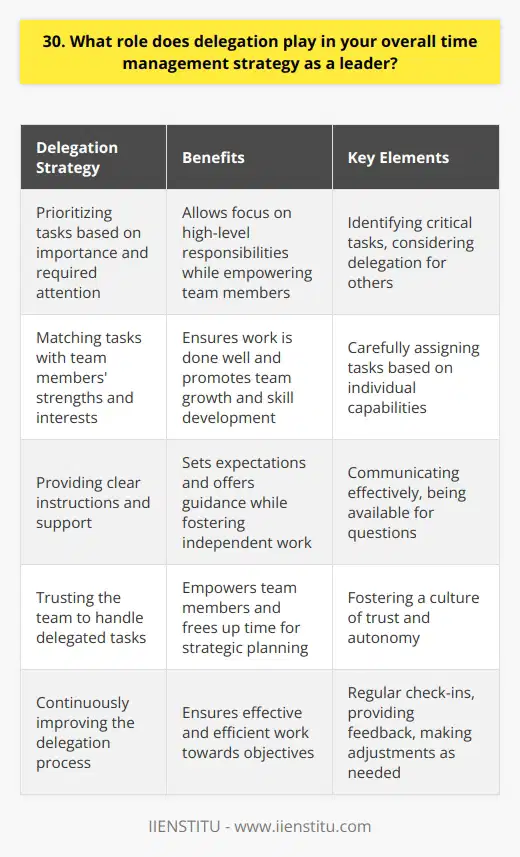
As an experienced leader, I've come to understand the profound influence that time management has on delegation choices. It's a topic that often arises in interviews, particularly for managerial roles, and it's one that requires careful consideration and a deep understanding of team dynamics and project requirements.
When I think back to my early days as a project manager, I remember the challenges I faced in balancing the demands of tight deadlines with the need to effectively distribute tasks among my team members. It was a steep learning curve, but over time, I developed strategies that allowed me to optimize our productivity and ensure that we consistently delivered high-quality results.
One of the key lessons I learned was the importance of prioritization. In any project, there are always tasks that are more critical than others, and it's essential to identify these early on. By focusing on the most important and time-sensitive tasks first, I could ensure that we were always making progress towards our goals, even when time was limited.
However, prioritization alone isn't enough. To truly be effective, it must be coupled with strategic delegation. This involves taking the time to understand the strengths and weaknesses of each team member and assigning tasks accordingly. By matching tasks to the individuals best suited to complete them, not only can you ensure that they are done efficiently, but you also provide opportunities for your team members to grow and develop their skills.
Interview Question: How Do Deadlines Affect Problem Solving?
Interview Question: Describe a Time Management Mistake and Your Learning From It.
I remember one project in particular where this approach was put to the test. We were working on a tight deadline for a client who was known for being particularly demanding. As the project manager, I knew that every minute counted, and I needed to be strategic in my delegation choices.
I started by breaking down the project into smaller, manageable tasks and assessing the skills required for each one. Then, I sat down with each team member individually to discuss their workload and get a sense of where they felt most confident contributing. Based on these conversations and my knowledge of their past performance, I created a detailed task allocation plan that played to everyone's strengths.
How Has Time Management Helped İn Meeting Deadlines İnterview Question
How To Prioritize Digital Marketing Tasks İnterview Question
The results spoke for themselves. By being deliberate in my delegation and providing clear instructions and deadlines, we were able to complete the project ahead of schedule and received glowing feedback from the client. It was a testament to the power of effective time management and strategic delegation.
But delegation isn't just about assigning tasks; it's also about trust and empowerment. When you delegate effectively, you're showing your team members that you have faith in their abilities and trust them to deliver results. This can be incredibly motivating and can help to foster a sense of ownership and accountability within the team.
Of course, delegating effectively also requires ongoing communication and support. It's important to regularly check in with team members to ensure they have the resources they need and to provide guidance and feedback as needed. By maintaining open lines of communication, you can quickly identify and address any challenges that arise, preventing them from derailing the project.
In my current role as a senior manager, I've continued to refine my approach to time management and delegation. One strategy that I've found particularly effective is the use of time-blocking. By dedicating specific blocks of time to certain tasks or projects, I can ensure that I'm giving each one the attention it deserves while also creating a sense of structure and predictability for my team.
I also make a point of regularly reviewing and adjusting my delegation choices based on changing project needs and team dynamics. As a leader, it's important to be flexible and adaptable, and to be willing to course-correct when necessary. By continually reassessing and optimizing my approach, I can ensure that I'm always making the most effective use of my team's time and talents.
In what ways does your time management skills affect your choices on delegation?
Can you explain the role of time management in your decision-making process regarding delegation?
How do your approaches to time management guide your decisions in delegation?
How are your delegation choices influenced by your time management strategies?
What influence does effective time management have on your delegating decisions?
Are the choices you make about delegation affected by your management of time?
How is the way you manage your time related to your choices about delegation?
Could you describe how your delegation decisions are impacted by time management?
What is the relationship between your management of time and your process of delegation?
Is there a connection between how you manage your time and your delegation preferences?
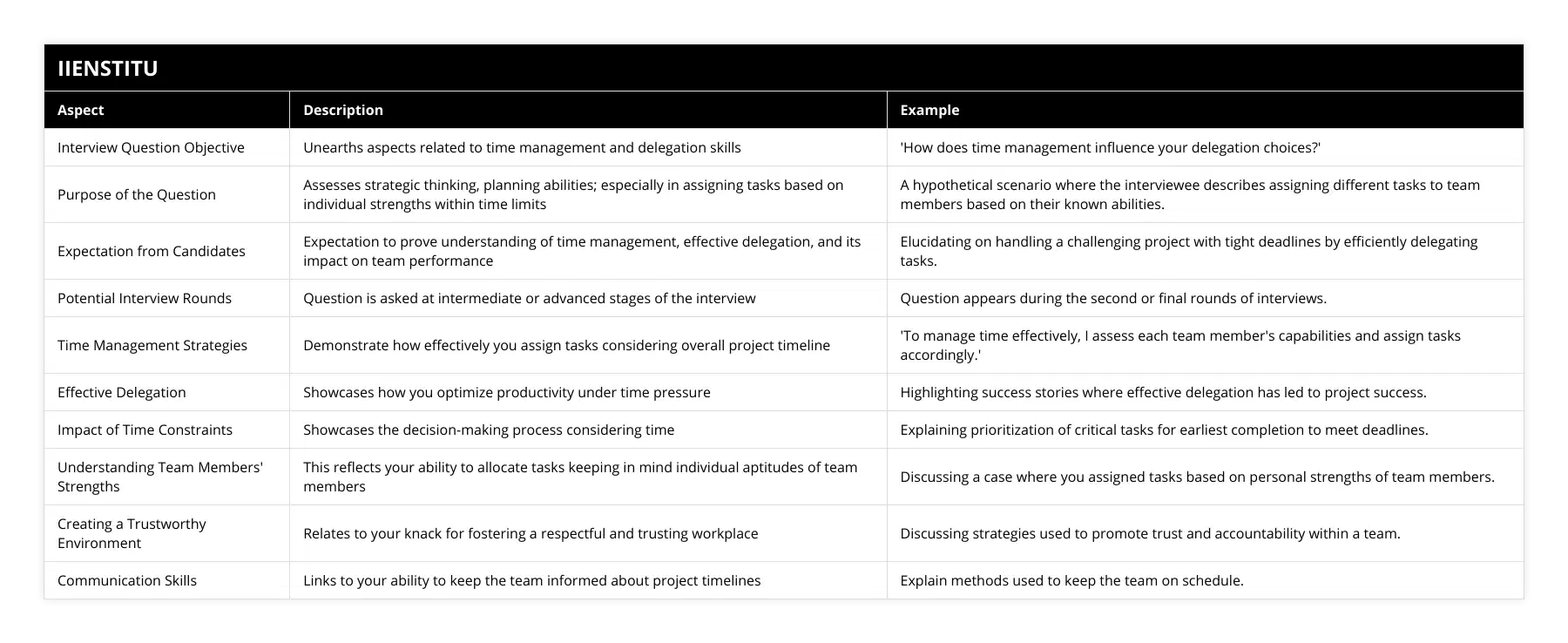
In many ways, effective delegation is both an art and a science. It requires a deep understanding of your team's capabilities, a strategic approach to task allocation, and a commitment to ongoing communication and support. When done well, it can be a powerful tool for maximizing productivity, building team morale, and achieving outstanding results.
So, in any interview situation, when asked about the influence of time management on delegation choices, I always emphasize the interconnectedness of these two key leadership skills. Effective time management is the foundation upon which successful delegation is built, and together, they form a potent combination that can drive teams to achieve extraordinary things.
Here are a few key points I would make sure to highlight:
1- Prioritization is key: Effective time management starts with identifying the most critical and time-sensitive tasks and ensuring they are tackled first.
2- Play to your team's strengths: Successful delegation involves understanding each team member's capabilities and assigning tasks accordingly.
3- Foster trust and empowerment: Delegation isn't just about task assignment; it's about trusting your team and empowering them to take ownership of their work.
4- Communicate and support: Ongoing communication and support are essential for ensuring delegated tasks are completed successfully and any challenges are addressed promptly.
5- Stay flexible and adaptable: As project needs and team dynamics change, it's important to regularly review and adjust your delegation choices to ensure ongoing effectiveness.
By articulating these points and backing them up with concrete examples from my own experience, I aim to demonstrate my deep understanding of the critical role time management plays in effective delegation and leadership. It's a topic I'm passionate about and one that I believe is fundamental to success in any managerial role.
Throughout my career, I've seen firsthand the impact that effective time management and delegation can have on team performance and morale. When team members feel trusted and empowered, and when they know that their time is being used wisely, they are more engaged, more motivated, and more likely to go the extra mile to ensure success.
But it's not just about the team; effective time management and delegation also have profound benefits for leaders themselves. By learning to prioritize effectively and delegate strategically, leaders can free up their own time to focus on the high-level strategic thinking and decision-making that are so essential to organizational success.
In my own practice, I've found that investing in the development of these skills has been one of the most rewarding and impactful things I've done as a leader. Not only has it helped me to achieve better results and build stronger teams, but it's also given me a greater sense of control and purpose in my work.
So, whether you're a seasoned leader or just starting out on your managerial journey, I urge you to prioritize the development of your time management and delegation skills. Seek out training and mentorship opportunities, learn from the experiences of others, and most importantly, put your learning into practice every day.
The rewards - for you, your team, and your organization - will be immeasurable. As the renowned management consultant Peter Drucker once said, "Until we can manage time, we can manage nothing else." So start managing your time wisely, and watch as your leadership potential soars.
References:
1- Covey, S. R. (2004). The 7 Habits of Highly Effective People: Powerful Lessons in Personal Change. Free Press.
2- Allen, D. (2001). Getting Things Done: The Art of Stress-Free Productivity. Penguin Books.
3- Drucker, P. F. (1967). The Effective Executive. Harper & Row.
4- Tracy, B. (2007). Time Power: A Proven System for Getting More Done in Less Time Than You Ever Thought Possible. AMACOM.
5- Zenger, J. H., & Folkman, J. (2009). The Extraordinary Leader: Turning Good Managers into Great Leaders. McGraw-Hill Education.
Frequently Asked Questions
1. How do you prioritize tasks when delegating responsibilities?
When delegating responsibilities, I prioritize tasks based on their urgency, importance, and the skills of my team members.
Assessing Urgency and Importance
I first evaluate each task's deadline and its impact on our overall goals. Critical tasks with tight deadlines get top priority. I also consider how each task aligns with the company's objectives and customer needs.
Matching Tasks to Skills
Next, I assess my team members' strengths, experience levels, and current workloads. I aim to assign tasks that best fit each person's abilities while ensuring no one gets overwhelmed. Challenging yet manageable tasks help my team grow.
Communicating Clearly
When delegating, I explain the task requirements, expectations, and deadlines. I encourage questions and provide resources to set my team up for success. Regular check-ins help me monitor progress and offer support as needed.
Staying Flexible
I understand that priorities can shift unexpectedly. I'm always ready to re-evaluate and adjust task assignments as situations change. Agility is key to keeping projects on track.
By carefully prioritizing tasks and delegating them to the right team members, I strive to maximize our productivity and deliver top-quality results.
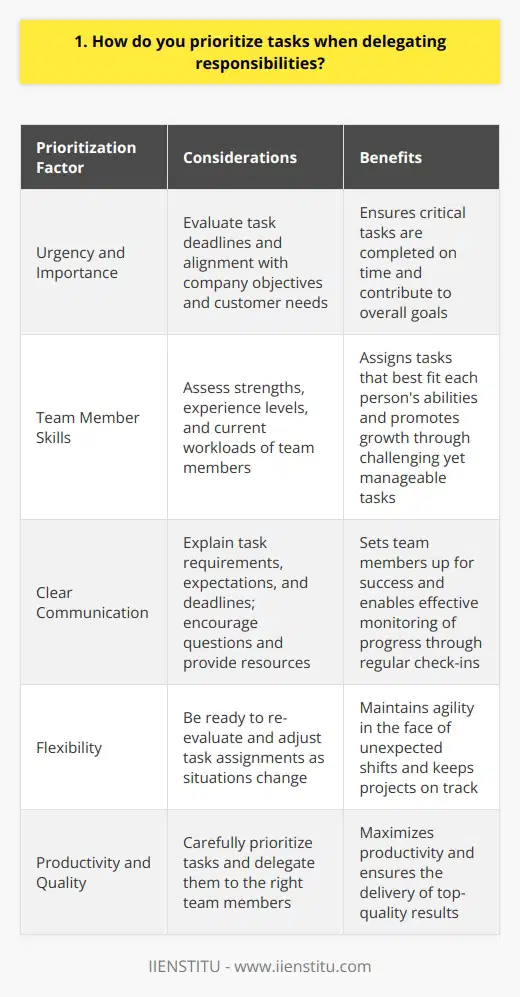
2. What strategies do you use to ensure tasks are completed on time?
I use several strategies to ensure tasks are completed on time. First, I break down projects into smaller, manageable tasks. This allows me to focus on one step at a time and avoid feeling overwhelmed.
Prioritizing Tasks
Next, I prioritize the tasks based on their importance and deadlines. I tackle the most critical and time-sensitive tasks first. This approach ensures that I make steady progress and don't fall behind schedule.
Effective Time Management
Effective time management is key to staying on track. I set realistic deadlines for each task and allocate sufficient time to complete them. I also build in some buffer time to account for unexpected challenges or interruptions.
Collaboration and Communication
I believe in the power of collaboration. When working on team projects, I maintain open lines of communication with my colleagues. Regular check-ins help us stay aligned, identify potential roadblocks, and make necessary adjustments to meet deadlines.
Staying Organized
Staying organized is crucial for meeting deadlines. I use tools like calendars, to-do lists, and project management software to keep track of tasks and deadlines. These tools help me stay on top of my workload and ensure nothing falls through the cracks.
By implementing these strategies consistently, I have developed a strong track record of completing tasks on time. I take pride in my ability to manage my workload effectively and deliver high-quality results within the given timeframe.
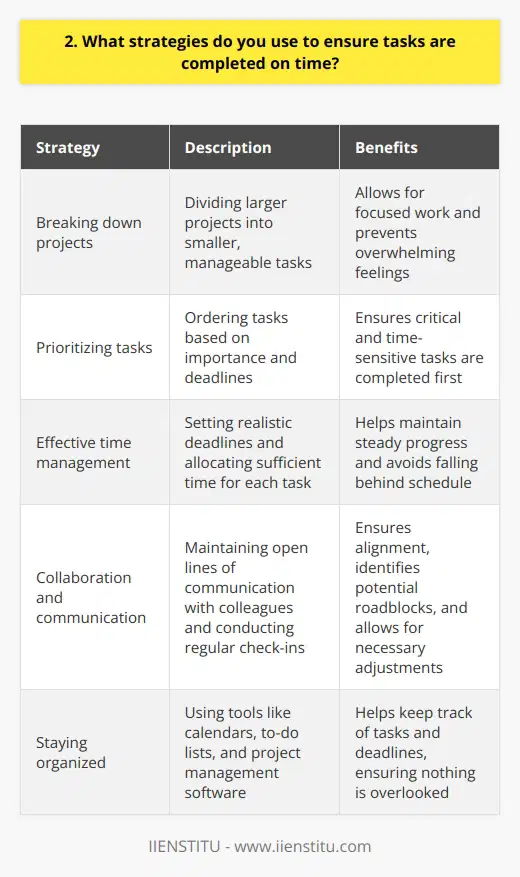
3. How do you determine which team members are best suited for specific tasks?
When determining which team members are best suited for specific tasks, I consider several key factors. First, I evaluate each individual's skills, experience, and expertise relevant to the task at hand. This helps me identify who has the necessary qualifications to excel in the role.
Assessing Strengths and Weaknesses
Next, I assess each team member's strengths and weaknesses. By understanding where they shine and where they may struggle, I can assign tasks that play to their strengths while providing opportunities for growth and development.
Considering Personal Interests and Motivation
I also take into account each person's interests and passions. When someone is genuinely excited about a task, they're more likely to be engaged, motivated, and committed to delivering exceptional results.
Evaluating Workload and Availability
Another important factor is workload and availability. I strive to distribute tasks evenly across the team, ensuring that no one is overwhelmed while others are underutilized. This helps maintain a healthy work-life balance and prevents burnout.
Fostering Collaboration and Teamwork
Finally, I consider how each task fits into the bigger picture and how team members can collaborate effectively. By assigning tasks that encourage teamwork and synergy, I aim to create a cohesive and high-performing team where everyone feels valued and contributes to the overall success of the project.
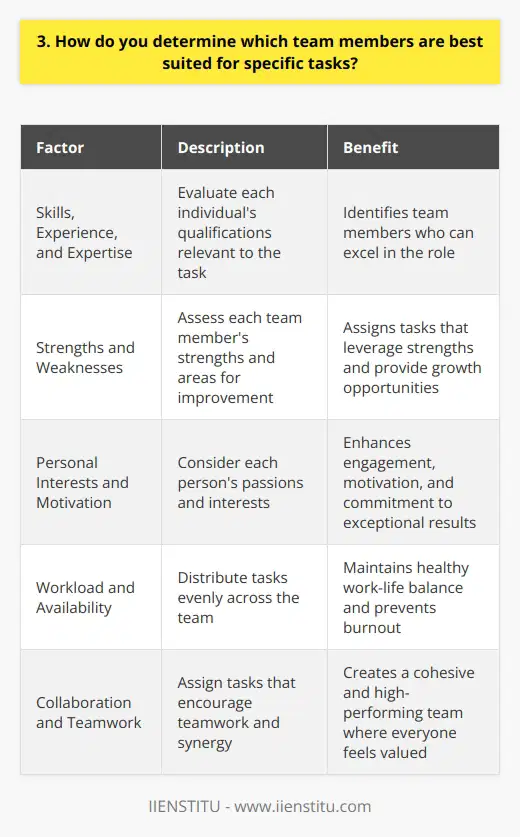
4. How do you balance the workload among your team members?
When balancing the workload among team members, I always start by assessing each person's strengths, skills, and experience. This helps me match tasks to the most suitable individuals, ensuring optimal performance and efficiency.
Encouraging Open Communication
I foster an environment of open communication where team members feel comfortable discussing their workload and challenges. Regular check-ins and one-on-one meetings help me stay informed about their progress and identify any potential issues early on.
Prioritizing and Delegating Tasks
I prioritize tasks based on urgency and importance, ensuring that critical projects are tackled first. When delegating responsibilities, I consider not only the team member's capabilities but also their current workload and availability. It's crucial to distribute tasks fairly and avoid overburdening any single individual.
Promoting Collaboration and Cross-Training
Encouraging collaboration among team members helps balance the workload and fosters knowledge sharing. Cross-training initiatives enable team members to develop new skills and support each other during peak periods or absences.
Monitoring Progress and Making Adjustments
I closely monitor the team's progress, using project management tools and regular status updates. If I notice that someone is struggling or overwhelmed, I proactively intervene and redistribute tasks as needed. Flexibility is key to maintaining a balanced workload and ensuring the team's overall success.
By following these strategies, I have successfully managed diverse teams and delivered projects on time and within budget. I believe that effective workload balancing is essential for maintaining a motivated, productive, and cohesive team.
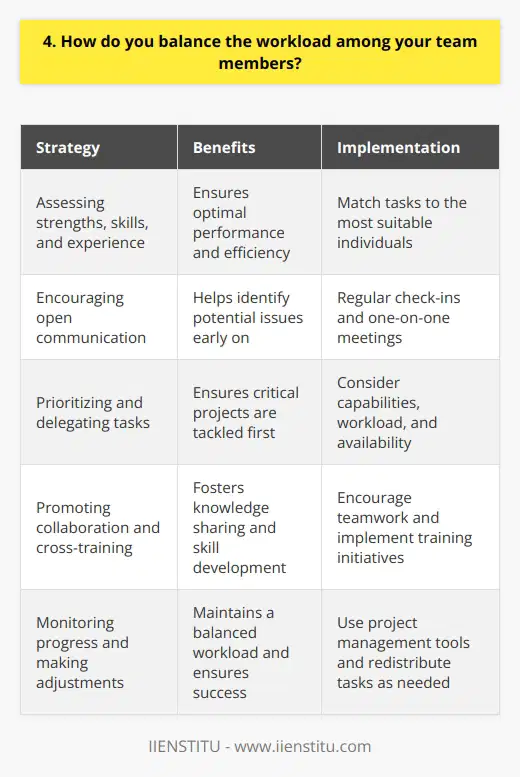
5. What methods do you use to monitor the progress of delegated tasks?
When delegating tasks, I use a combination of methods to monitor progress and ensure successful completion. Here are some key strategies I employ:
Regular Check-Ins
I schedule brief, periodic meetings with team members to discuss their progress, challenges, and next steps. This helps me stay informed and provide guidance as needed.
Progress Tracking Tools
I utilize project management software like Trello or Asana to create task lists, set deadlines, and track progress. These tools provide visibility and accountability for everyone involved.
Open Communication Channels
I encourage open communication within the team. I make myself available for questions and updates via email, chat, or impromptu discussions. This fosters collaboration and timely problem-solving.
Milestone Reviews
For longer projects, I break them down into key milestones. I review progress at each milestone to ensure we're on track and make any necessary adjustments.
By using these methods, I can effectively monitor delegated tasks while empowering my team to take ownership of their work. It's all about striking a balance between oversight and trust.
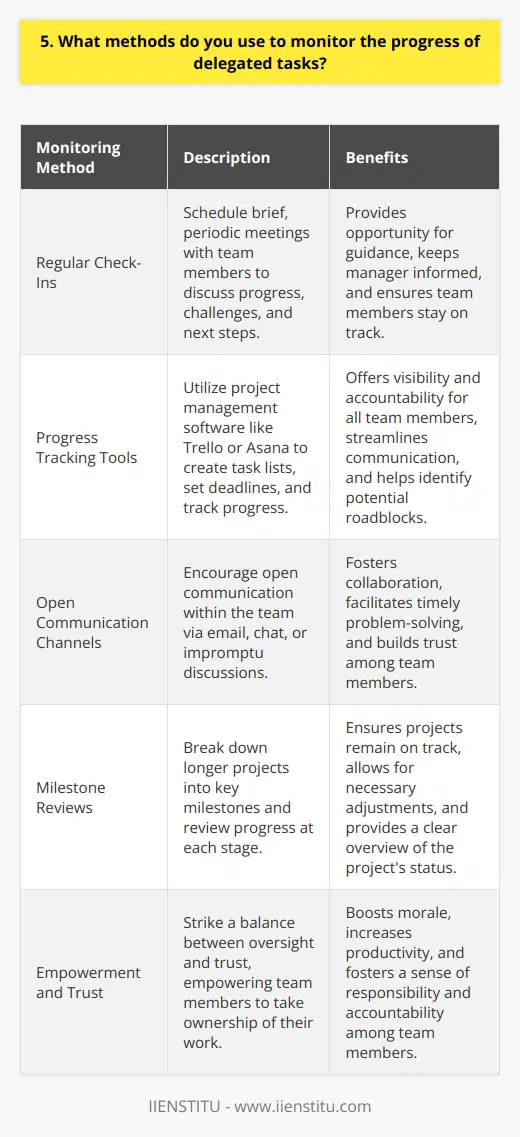
6. How do you handle a situation where a delegated task is not completed on time?
When a delegated task isn't completed on time, I first try to understand the reasons behind the delay. There could be various factors at play, such as unclear instructions, unexpected obstacles, or competing priorities.
Communicate openly and empathetically
I approach the team member with an open mind and a supportive attitude. I listen actively to their perspective and show empathy for the challenges they faced. Together, we identify the root causes of the delay and brainstorm solutions.
Reassess priorities and resources
If the delay is due to competing priorities or limited resources, I work with the team member to reassess their workload and allocate additional support if needed. We review the project timeline and adjust deadlines or deliverables as necessary.
Provide guidance and support
If the delay stems from unclear instructions or a lack of skills, I take responsibility for providing clearer guidance and necessary training. I break down the task into smaller, manageable steps and offer regular check-ins to ensure progress stays on track.
Learn and improve for the future
Once the task is completed, I reflect on the experience with the team member. We identify areas for improvement in our delegation process, communication, and project management. By learning from each challenge, we continuously enhance our teamwork and efficiency.
Throughout the process, I maintain a positive and solution-oriented mindset. I believe in focusing on moving forward rather than dwelling on past missteps. By supporting my team members through challenges, we build trust, resilience, and a stronger sense of collaboration.
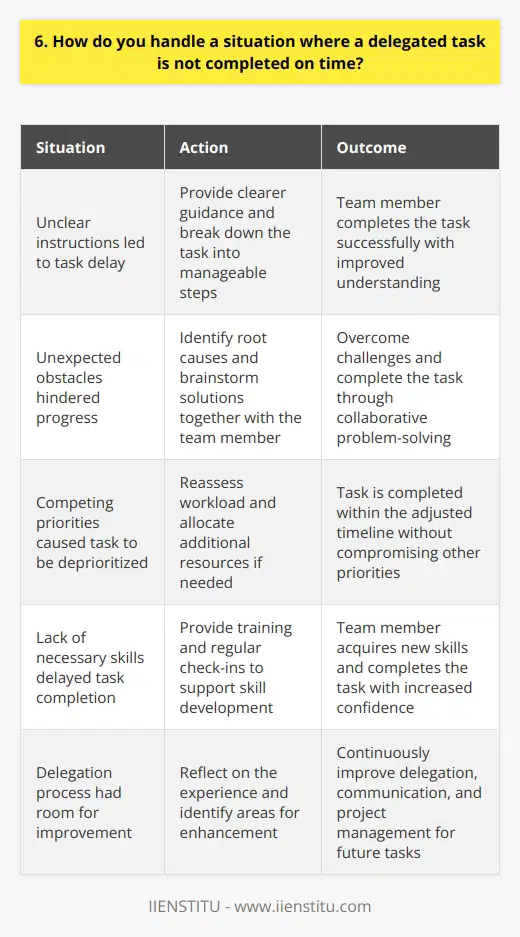
7. How do you ensure that your team members understand the objectives and deadlines of their tasks?
When it comes to ensuring that my team members understand the objectives and deadlines of their tasks, I believe in clear communication and collaboration. I always make sure to break down complex projects into smaller, manageable tasks with specific goals and timelines.
Setting Expectations
From the very beginning, I sit down with each team member individually to discuss their role and responsibilities. We go over the project scope, deliverables, and due dates together. This helps them see the bigger picture and how their work fits into the overall goal.
Regular Check-Ins
Throughout the project, I schedule regular check-ins with my team. These meetings provide an opportunity for everyone to share updates, ask questions, and raise any concerns they may have. It's a chance for me to offer guidance and support, and make sure we're all on the same page.
Visual Aids
I'm a big fan of using visual aids like Gantt charts and Kanban boards to track progress and deadlines. These tools help keep everyone accountable and give a clear overview of where we are in the project timeline. Plus, it's satisfying to move tasks from "in progress" to "completed"!
Encouraging Questions
I always encourage my team members to ask questions if they're unsure about anything. No question is too small or silly. I want them to feel comfortable coming to me for clarification or advice. After all, we're in this together!
At the end of the day, it's about creating a supportive and collaborative environment where everyone feels heard and valued. When we work together towards a common goal, amazing things can happen.
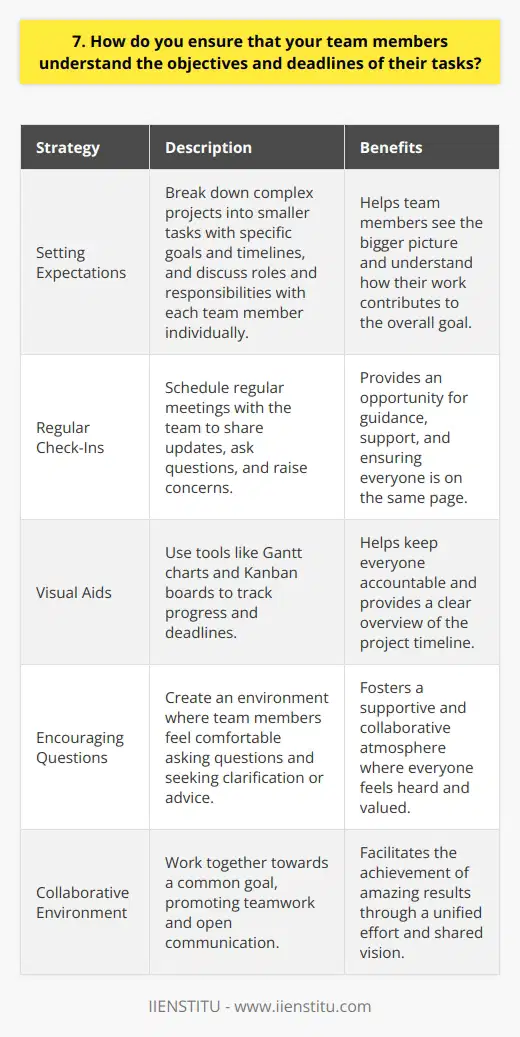
8. What factors do you consider when setting deadlines for delegated tasks?
When setting deadlines for delegated tasks, I consider several key factors to ensure successful outcomes:
Scope and Complexity
I assess the task's scope and complexity to determine a realistic timeline. More intricate tasks require additional time.
Available Resources
I evaluate the resources at hand, including team members' skills and workload, to establish achievable deadlines.
Dependencies and Risks
I identify potential dependencies and risks that could impact the timeline, building in buffers to mitigate delays.
Stakeholder Expectations
I consider stakeholder expectations and align deadlines with their needs, ensuring clear communication throughout the process.
Team Input
I believe in collaborating with team members to set deadlines, valuing their insights and fostering a sense of ownership.
In my previous role, I successfully managed a complex project with multiple dependencies by carefully considering these factors. By breaking down the tasks, allocating resources effectively, and maintaining open lines of communication, we delivered the project on time and exceeded stakeholder expectations.
Ultimately, setting realistic deadlines is a balancing act that requires careful planning, adaptability, and a commitment to delivering quality work. I approach this responsibility with a strategic mindset and a dedication to driving successful outcomes.
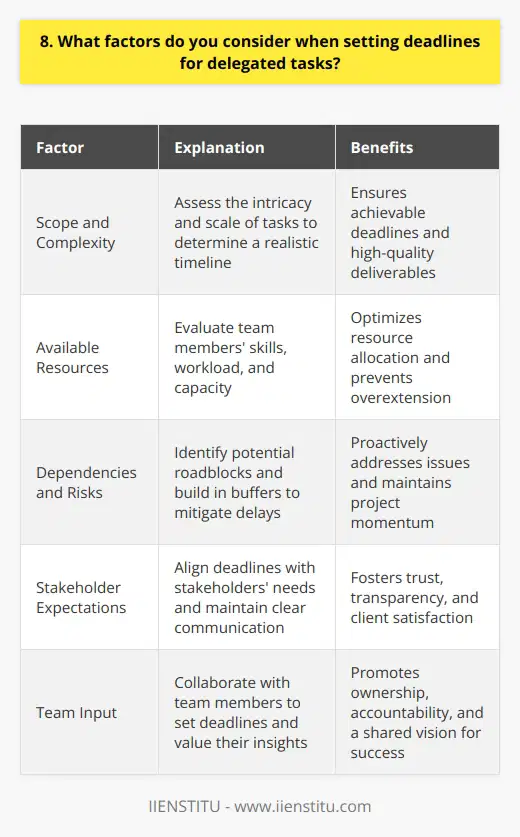
9. How do you adapt your delegation style to accommodate different time constraints?
When delegating tasks under time constraints, I adapt my approach to ensure successful completion. Here are some strategies I employ:
Assess the Urgency and Importance
I quickly evaluate the urgency and importance of each task. This helps me prioritize effectively and allocate resources accordingly.
Communicate Clearly and Concisely
Under time pressure, clear communication is crucial. I provide concise instructions and expectations to minimize confusion and ensure everyone is on the same page.
Empower Team Members
I trust my team's abilities and empower them to make decisions. This saves time and allows for quicker progress.
Monitor Progress Closely
With tight deadlines, I closely monitor progress and provide support where needed. Regular check-ins help identify and resolve issues promptly.
Be Flexible and Adaptable
Sometimes, unexpected challenges arise. I remain flexible and adapt my delegation style to accommodate changing circumstances and ensure timely completion.
I remember a project where we had a tight deadline and limited resources. By assessing the situation, communicating clearly, empowering my team, and staying flexible, we successfully delivered the project on time. It was a stressful experience, but the satisfaction of overcoming the challenge was immense.
Ultimately, adapting my delegation style to different time constraints is about being proactive, decisive, and supportive. By employing these strategies, I ensure that tasks are completed efficiently and effectively, even under pressure.
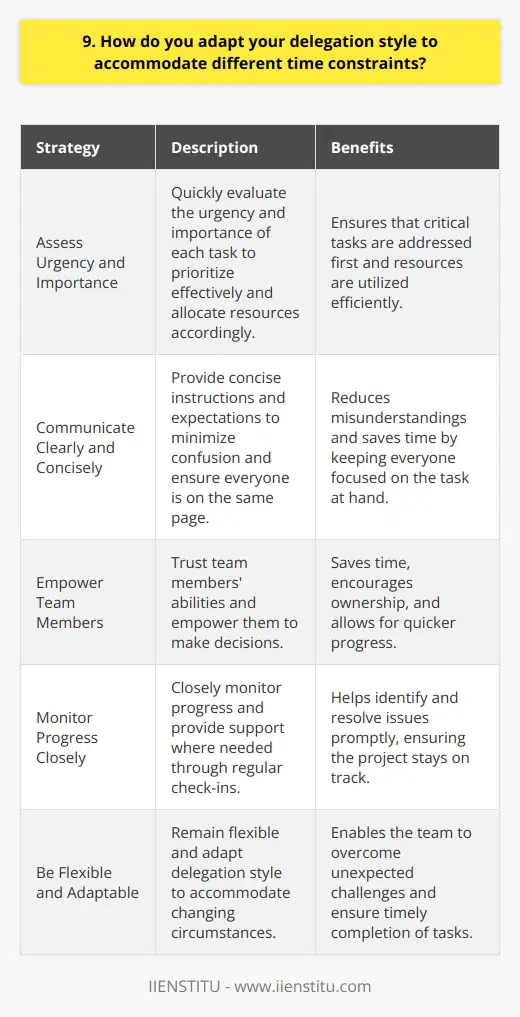
10. How do you encourage your team members to manage their time effectively?
As a team leader, I believe in the power of effective time management. Over the years, I've developed several strategies to help my team members stay on track and maximize their productivity.
Lead by Example
I always strive to model good time management habits myself. When my team sees me prioritizing tasks, avoiding distractions, and meeting deadlines, they're more likely to follow suit. It's about setting the right tone and expectations from the top down.
Encourage Prioritization
I work with each team member to identify their most important tasks and responsibilities. We discuss how to prioritize their workload based on urgency, impact, and alignment with our overall goals. This helps them focus on what truly matters and avoid getting bogged down in less critical activities.
Promote Planning and Scheduling
I'm a big believer in the power of planning. I encourage my team to break down large projects into smaller, manageable steps and create realistic timelines. We use tools like shared calendars and project management software to keep everyone on the same page and ensure deadlines are met.
Foster Open Communication
Regular check-ins and open communication are essential for effective time management. I make myself available to discuss any challenges or roadblocks my team members encounter. We work together to find solutions and adjust plans as needed. This collaborative approach helps us stay agile and responsive.
Encourage Work-Life Balance
Finally, I recognize the importance of work-life balance. I encourage my team to take breaks, disconnect when needed, and prioritize self-care. When people feel refreshed and recharged, they're more likely to be productive and efficient during work hours. It's about creating a sustainable and healthy work environment for everyone.
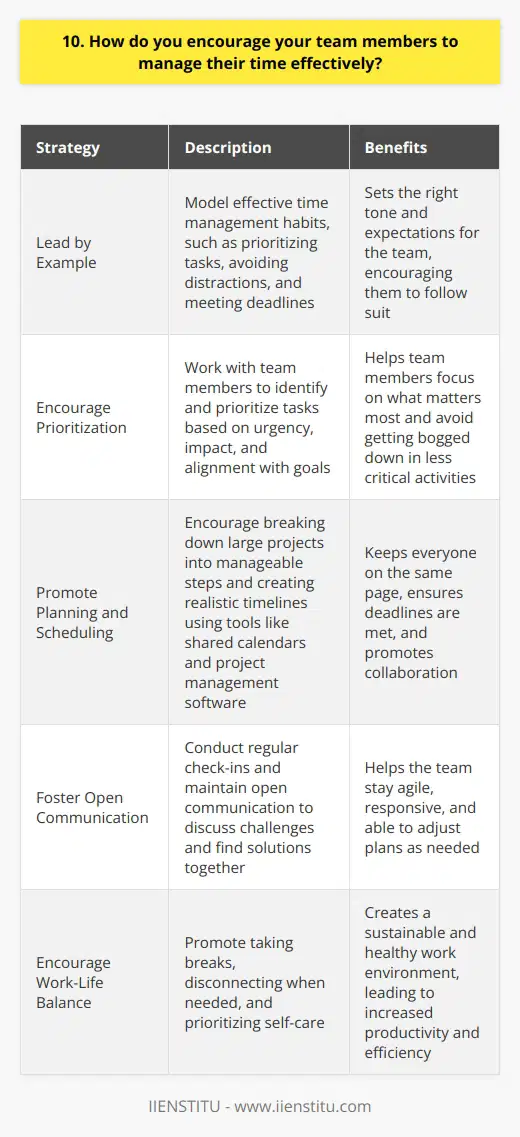
11. What role does communication play in your delegation process?
Communication is a crucial aspect of my delegation process. When assigning tasks to team members, I make sure to clearly explain the objectives, expectations, and deadlines. This ensures that everyone is on the same page and understands their responsibilities.
Active Listening
I believe in the power of active listening. When delegating tasks, I pay close attention to any concerns or questions my team members may have. By truly hearing them out, I can address any potential roadblocks and provide the necessary support for their success.
Providing Feedback
Regular feedback is an integral part of my delegation process. I make it a point to check in with my team members, offer constructive criticism when needed, and praise their accomplishments. This open communication fosters a positive work environment and encourages growth.
Encouraging Open Dialogue
I always encourage an open dialogue within my team. I want my team members to feel comfortable coming to me with any issues or ideas they may have. By promoting a culture of open communication, we can work together to find solutions and drive projects forward.
Leading by Example
As a leader, I believe in leading by example. I strive to maintain clear and consistent communication in all my interactions. By setting this standard, I hope to inspire my team to do the same, ultimately enhancing our overall collaboration and productivity.
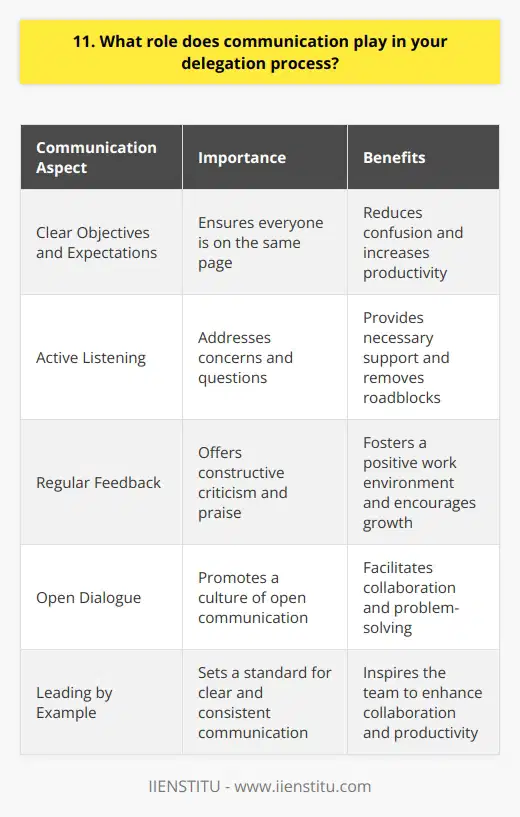
12. How do you handle a team member who consistently misses deadlines?
When dealing with a team member who consistently misses deadlines, I believe in taking a proactive and supportive approach. In my experience, the first step is to have an open and honest conversation with the individual to understand the root cause of the issue.
Identifying the Problem
It's essential to determine if there are any personal or professional challenges that are hindering their performance. Perhaps they're overwhelmed with their workload, facing a learning curve with new tasks, or dealing with personal issues that are impacting their work.
Collaborative Problem-Solving
Once the underlying reasons are identified, I work collaboratively with the team member to find solutions. This might involve:<ul><li>Reviewing their workload and redistributing tasks if necessary</li><li>Providing additional training or resources to help them improve their skills</li><li>Offering flexibility in their schedule to accommodate personal needs</li></ul>
Setting Clear Expectations
I also believe in setting clear expectations and deadlines for all team members. By breaking down projects into smaller, manageable tasks with specific due dates, it becomes easier to track progress and identify potential roadblocks early on.
Regular Check-Ins and Feedback
Regular check-ins and feedback sessions are crucial to ensure that everyone stays on track. These meetings provide an opportunity to assess progress, address any challenges, and offer support or guidance as needed.
Leading by Example
As a team leader, I strive to lead by example. I hold myself accountable to the same standards I expect from my team, including meeting deadlines and delivering high-quality work. By demonstrating a strong work ethic and commitment to excellence, I hope to inspire and motivate others to do the same.
Ultimately, handling a team member who consistently misses deadlines requires a combination of empathy, clear communication, and a willingness to work together towards a solution. By fostering a supportive and collaborative team environment, we can help everyone succeed and achieve our shared goals.
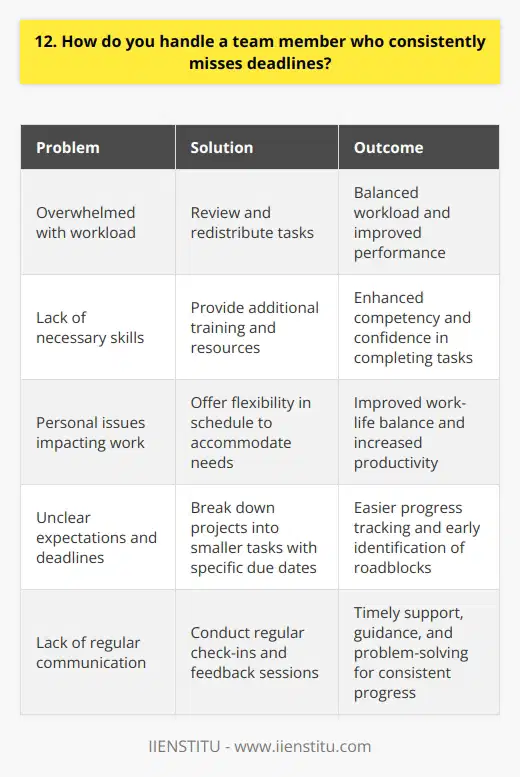
13. How do you delegate tasks to ensure that projects are completed efficiently?
When delegating tasks, I first assess the strengths and capabilities of each team member. This allows me to assign responsibilities that align with their skills and expertise, ensuring optimal performance and efficiency.
Clear Communication and Expectations
I believe in providing clear instructions and setting well-defined expectations when delegating tasks. I take the time to explain the project goals, deadlines, and any specific requirements to ensure everyone is on the same page. This clarity helps team members understand their roles and responsibilities, reducing confusion and minimizing the need for constant supervision.
Empowering Team Members
I trust my team and empower them to take ownership of their assigned tasks. By giving them the autonomy to make decisions and solve problems independently, I foster a sense of accountability and motivation. I'm always available to provide guidance and support when needed, but I believe in letting my team members grow and develop their skills through hands-on experience.
Regular Check-ins and Progress Tracking
To ensure projects stay on track, I schedule regular check-ins with team members. These meetings allow us to discuss progress, identify any obstacles, and make necessary adjustments. I also use project management tools to monitor timelines, deliverables, and milestones. This helps me identify potential bottlenecks early on and take proactive measures to keep projects moving forward efficiently.
By combining effective communication, empowerment, and progress tracking, I aim to create a collaborative and efficient work environment where projects are completed successfully and team members thrive in their roles.
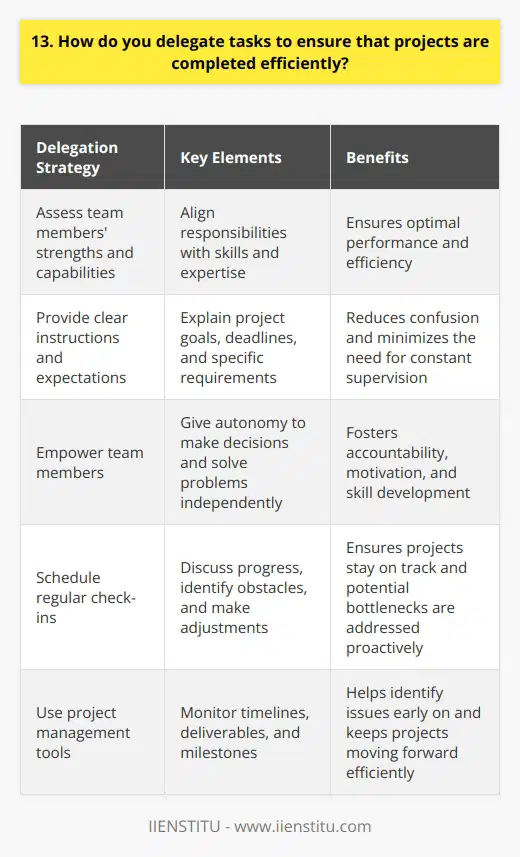
14. What techniques do you use to estimate the time required for different tasks?
When estimating the time required for different tasks, I rely on a combination of techniques. First and foremost, I draw upon my past experiences with similar projects to gauge the approximate duration. This helps me establish a realistic baseline for the task at hand.
Breaking Down Tasks
Next, I break down the task into smaller, manageable subtasks. By dissecting the project into its constituent parts, I can more accurately assess the time needed for each component. This approach allows me to identify potential bottlenecks and allocate resources accordingly.
Seeking Input from Colleagues
I also believe in the power of collaboration. When faced with a complex or unfamiliar task, I don't hesitate to seek input from my colleagues. Their insights and experiences can provide valuable perspective and help refine my time estimates.
Building in Buffer Time
Finally, I always build in a bit of buffer time to account for unexpected challenges or delays. Life rarely goes according to plan, so it's crucial to have some wiggle room. This ensures that even if things don't go perfectly, I can still deliver on time.
At the end of the day, estimating task durations is a blend of art and science. By leveraging my experiences, breaking down tasks, collaborating with others, and allowing for flexibility, I strive to provide accurate and realistic timelines for all my projects.
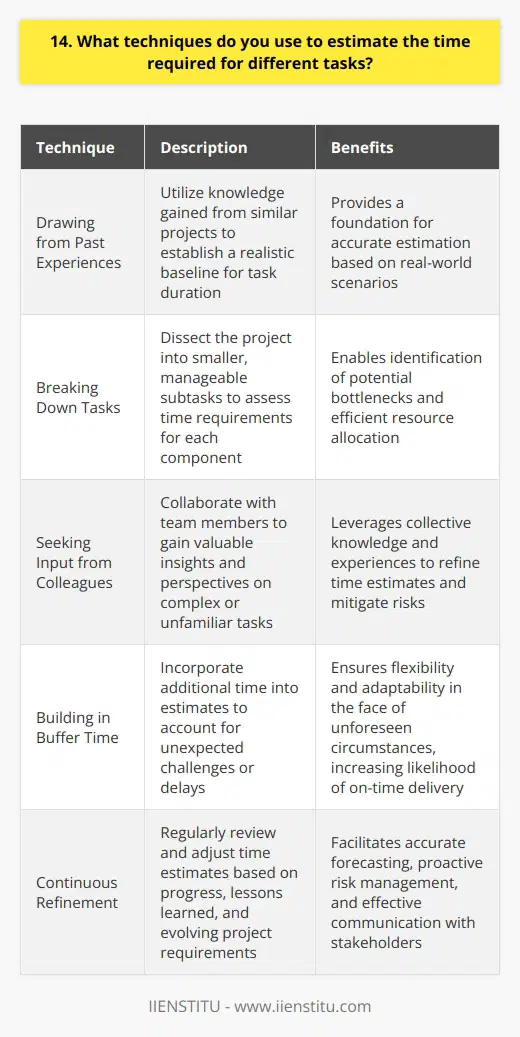
15. How do you manage your own time while overseeing delegated tasks?
I manage my time while overseeing delegated tasks by utilizing a combination of techniques:
Prioritizing and Planning
I start each day by reviewing my to-do list and prioritizing tasks based on urgency and importance. This helps me focus on the most critical items first and ensures that nothing falls through the cracks. I also break larger projects into smaller, manageable steps to avoid feeling overwhelmed.
Setting Clear Expectations
When delegating tasks, I provide clear instructions and deadlines to my team members. This eliminates confusion and ensures that everyone is on the same page. I also make myself available to answer any questions or provide guidance as needed.
Regular Check-Ins
I schedule regular check-ins with my team to monitor progress and address any concerns or obstacles. These meetings allow me to stay informed about the status of delegated tasks and make any necessary adjustments to timelines or resources.
Utilizing Technology
I rely on project management software and collaboration tools to keep track of assignments and communicate with my team. These platforms help me stay organized and provide real-time updates on the progress of delegated tasks.
Flexibility and Adaptability
Despite my best efforts to plan and prioritize, unexpected issues can arise. When this happens, I remain flexible and adapt my schedule as needed. I also encourage my team to communicate any challenges they encounter so that we can work together to find solutions.
By combining these strategies, I am able to effectively manage my own time while ensuring that delegated tasks are completed successfully and on schedule.
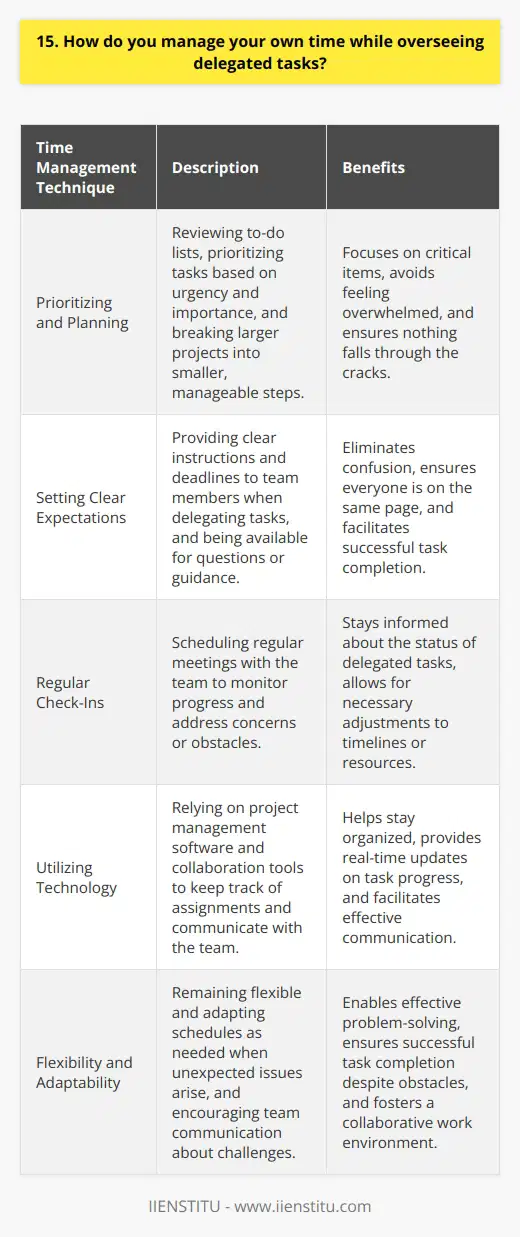
16. How do you handle a situation where multiple tasks have conflicting deadlines?
When faced with multiple tasks that have conflicting deadlines, I prioritize based on urgency and importance. I communicate with my team and supervisors to understand which tasks are most critical and time-sensitive.
Strategies for Managing Conflicting Deadlines
I use a few key strategies to stay organized and on top of competing priorities:
1. Make a prioritized to-do list
I list out all the tasks and rank them by urgency and importance. This helps me focus my efforts.
2. Break tasks into smaller steps
Taking a big project and dividing it into manageable chunks makes it feel less overwhelming. I set mini-deadlines for each step.
3. Communicate proactively
I keep my team in the loop about my progress and any obstacles that arise. If I need to negotiate a deadline, I explain why and propose a reasonable alternative.
Leveraging Technology and Teamwork
Project management software helps me track deadlines, share files, and collaborate with colleagues. When crunch time hits, I'm not afraid to ask for help. We're all working towards the same goals.
At my last job, I once had three major projects due the same week. By working closely with my teammates, delegating tasks, and putting in a few extra hours, we got it all done on time. Our supervisor praised our teamwork and organization.
In summary, I've found that the keys to juggling conflicting deadlines are prioritization, communication, and collaboration. It's challenging but definitely doable with the right mindset and tools. I actually enjoy the adrenaline rush of working under pressure and pulling together to meet a tight timeline. There's no better feeling than crossing that last item off the to-do list right on schedule.
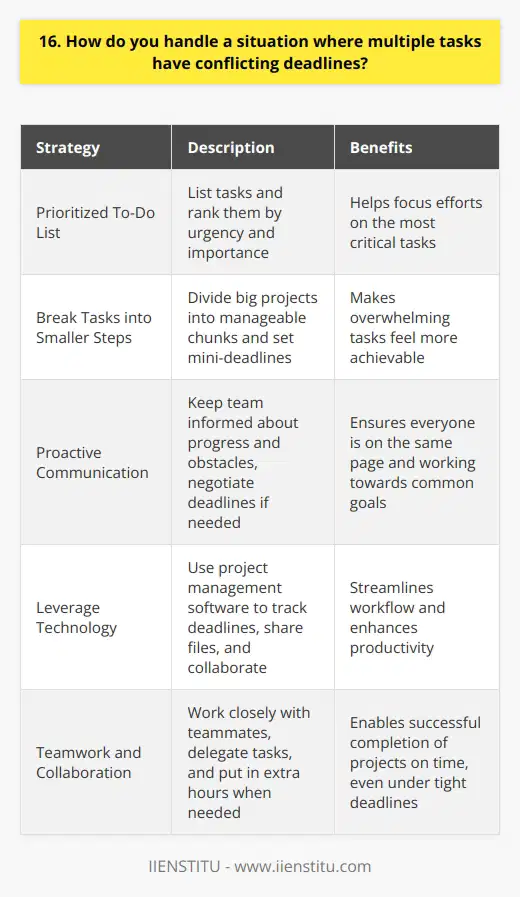
17. What strategies do you use to delegate tasks in a way that maximizes productivity?
When delegating tasks, I focus on matching the right person to the right task based on their skills and strengths. This ensures that everyone is working on something they're well-suited for, leading to higher quality work and efficiency.
Clear Communication is Key
I always strive to communicate the goals, expectations, and deadlines for each task clearly and directly. This helps team members understand exactly what's needed from them and by when, minimizing confusion and wasted effort. Checking for understanding is also crucial to make sure we're all on the same page.
Empowering Ownership and Initiative
Rather than micromanaging, I believe in giving people ownership over their assigned tasks and encouraging them to take initiative. When folks feel trusted and empowered, they tend to be more engaged, motivated, and likely to go the extra mile. I'm always available to provide guidance and support as needed, but I try to give team members space to tackle things their way.
Optimizing Workloads
To maximize productivity, it's important to delegate in a way that balances and optimizes everyone's workloads. I consider each team member's current responsibilities, bandwidth, and any upcoming time off to avoid overloading any one person. The goal is to challenge people just enough to keep them in a state of flow, without burning them out.
Flexibility and Adaptability
Even the best-laid delegation plans sometimes need adjusting. I stay attuned to how tasks are progressing, any roadblocks that arise, and team members' evolving capacities. If any redistribution or re-prioritization is needed along the way to maintain productivity, I make those judgment calls and communicate changes proactively.
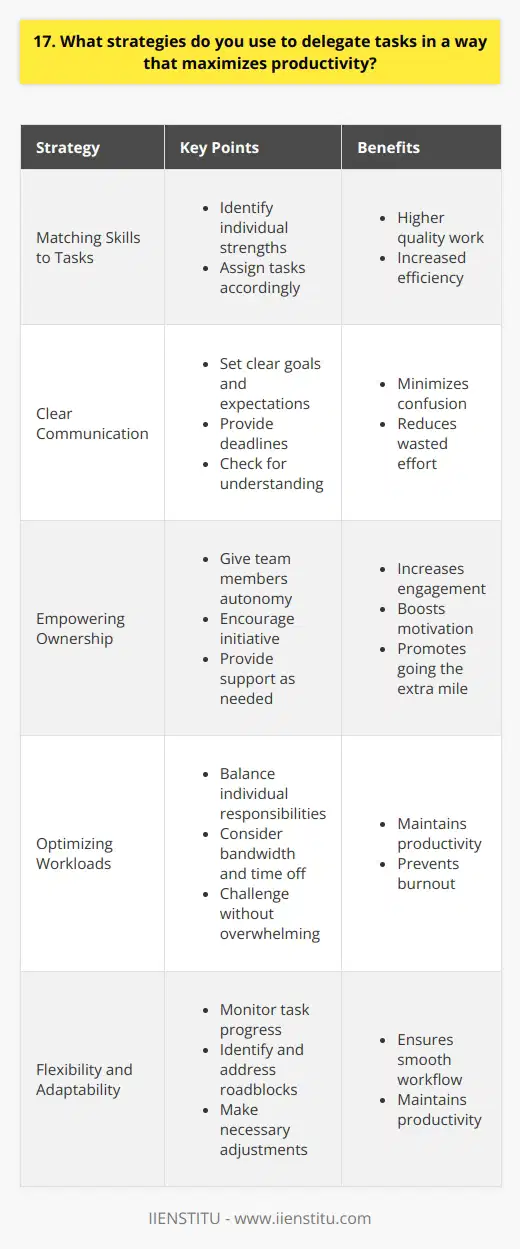
18. How do you ensure that your team members have the necessary resources to complete their tasks on time?
As a team leader, I understand the importance of providing my team with the necessary resources to complete their tasks efficiently and on time. Here are some strategies I employ to ensure this:
Regular Check-Ins and Communication
I schedule regular check-ins with each team member to discuss their progress, challenges, and resource needs. This helps me stay informed about their work and address any issues promptly. Open communication is key to understanding and fulfilling their requirements.
Prioritizing and Allocating Resources
I prioritize tasks based on their urgency and importance. This allows me to allocate resources accordingly. I also keep a buffer for unexpected needs that may arise. By being proactive in resource allocation, I minimize the chances of delays due to resource constraints.
Collaborating with Other Teams and Departments
Sometimes, the required resources may not be readily available within our team. In such cases, I reach out to other teams or departments to secure the necessary resources. Building strong relationships with colleagues across the organization helps in smooth resource sharing and collaboration.
Empowering Team Members
I believe in empowering my team members to take ownership of their work. I provide them with the necessary tools, training, and authority to make decisions related to their tasks. This not only boosts their confidence but also enables them to resolve resource-related issues independently.
By implementing these strategies, I have successfully managed to keep my team well-equipped and motivated to deliver their best work on time.
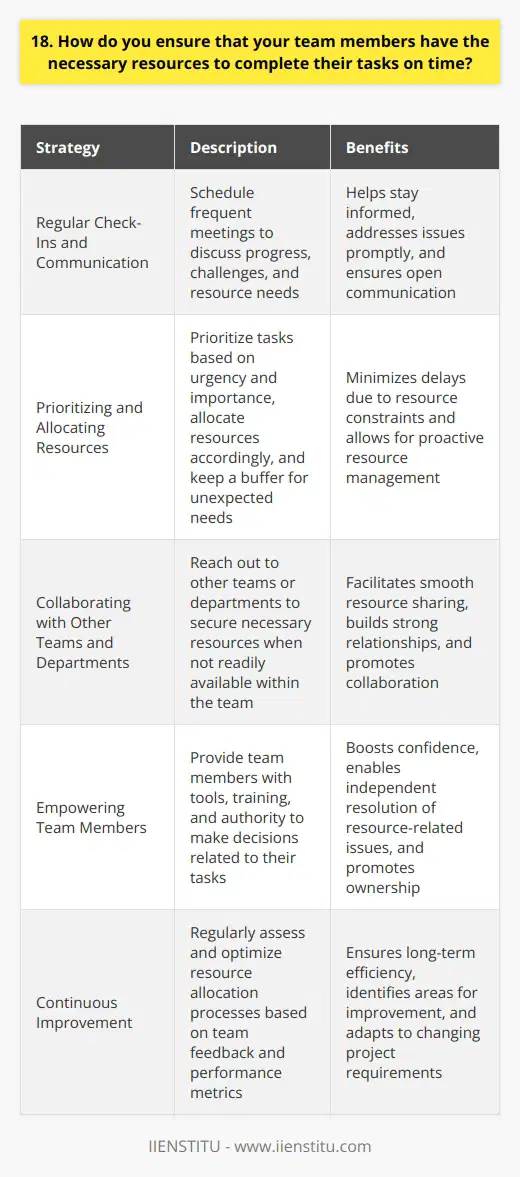
19. How do you handle a situation where a team member is overwhelmed with their delegated tasks?
When a team member is overwhelmed with their tasks, my first step is to have an open discussion with them. I approach the situation with empathy and understanding, acknowledging that everyone faces challenges at work. During our conversation, I actively listen to their concerns and try to identify the root causes of their workload issues.
Prioritizing and Redistributing Tasks
After understanding the situation, I work with the team member to prioritize their tasks based on urgency and importance. We break down larger tasks into smaller, manageable chunks and set realistic deadlines. If necessary, I redistribute some of their tasks to other team members who have the capacity and skills to handle them. This helps to alleviate the pressure on the overwhelmed individual and ensures that the team's overall objectives are met.
Providing Support and Resources
I believe in providing my team members with the support and resources they need to succeed. This may involve offering additional training, guidance, or tools to help them work more efficiently. I also encourage them to communicate openly about any challenges they face and to seek help when needed. By fostering a supportive team environment, we can overcome obstacles together.
Monitoring Progress and Adjusting Strategies
After implementing these strategies, I closely monitor the team member's progress and well-being. I schedule regular check-ins to assess their workload and make any necessary adjustments. If the situation persists, I explore long-term solutions such as process improvements, automation, or even hiring additional team members to ensure a sustainable workload for everyone.
Throughout the process, I maintain open lines of communication, offer encouragement, and recognize the team member's efforts. By addressing workload issues proactively and collaboratively, we can maintain a healthy and productive team dynamic.
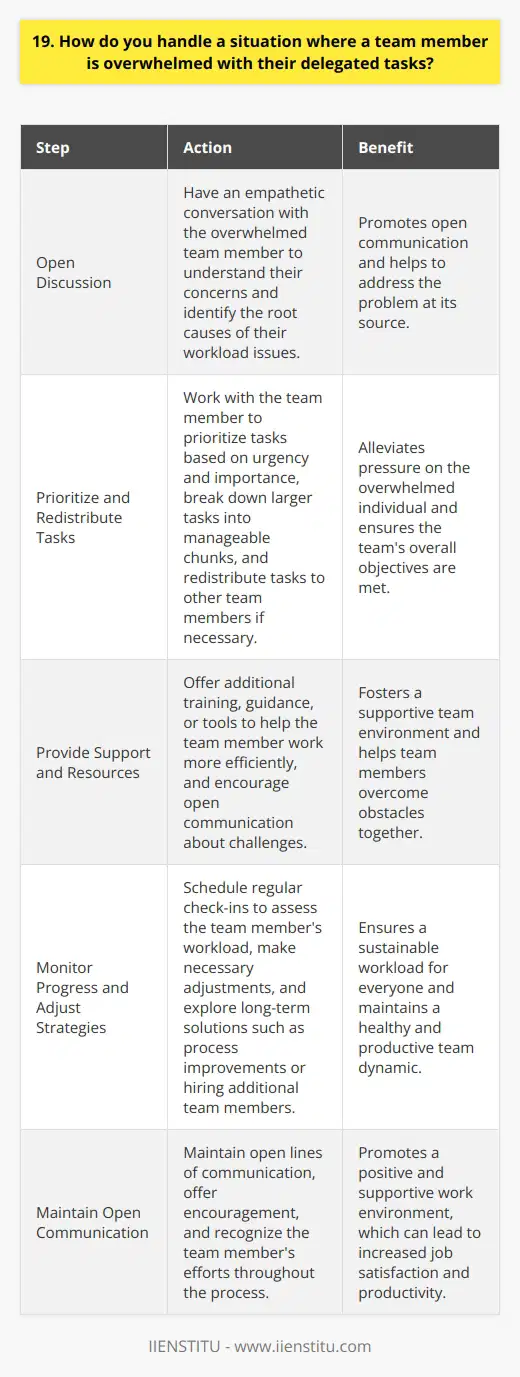
20. What methods do you use to provide feedback on the progress of delegated tasks?
When delegating tasks, I believe in maintaining open lines of communication and providing regular feedback. This helps ensure that team members are on track and meeting expectations.
Set Clear Expectations Upfront
I always make sure to clearly explain the desired outcomes and deadlines when assigning a task. This sets the stage for effective progress monitoring and feedback.
Schedule Regular Check-ins
Depending on the complexity and timeline of the task, I schedule periodic check-ins with team members. These could be quick status updates via chat or email, or more in-depth meetings to discuss progress and challenges.
For example, when I was leading a website redesign project last year, I held brief daily stand-ups with the team. We reviewed what was accomplished, what was planned for the day ahead, and any obstacles that needed to be addressed. These frequent touchpoints helped keep the project on schedule.
Provide Constructive Feedback
When offering feedback, I strive to be specific, timely, and constructive. If a team member is excelling, I acknowledge their good work and the positive impact it's having. If someone is struggling or off-track, I share my observations objectively and offer guidance or resources to help them improve.
I've found that delivering feedback with empathy and a focus on problem-solving helps team members feel supported rather than criticized. The goal is always to help them succeed and grow.
Encourage Two-Way Communication
Finally, I believe feedback should be a two-way dialogue. I actively invite team members to share their own updates, insights, and ideas. Their perspectives are invaluable for identifying risks, making course corrections, and discovering process enhancements.
By fostering a culture of open communication and continuous feedback, I aim to empower team members, build trust, and drive strong results on delegated tasks.
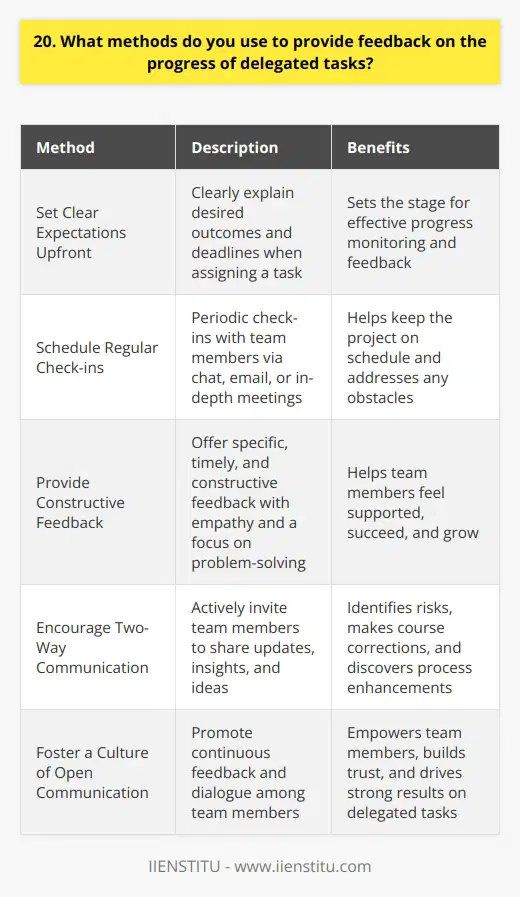
21. How do you foster a sense of accountability among your team members regarding deadlines?
I believe fostering accountability among team members is crucial for meeting deadlines and achieving goals. One key strategy I employ is setting clear expectations from the outset. During initial project discussions, I collaborate with the team to establish well-defined roles, responsibilities, and deadlines for each member.
Regular Check-Ins and Updates
Throughout the project, I schedule regular check-ins with the team. These meetings serve as opportunities for members to provide updates on their progress, discuss any challenges they're facing, and brainstorm solutions together. By maintaining open lines of communication, we can proactively address any issues that may impact the timeline.
Encouraging Ownership and Initiative
I also strive to create an environment that encourages ownership and initiative among team members. When individuals feel personally invested in the project's success, they're more likely to take accountability for their tasks. I provide autonomy and trust, allowing team members to take charge of their work while offering support and guidance when needed.
Celebrating Successes and Learning from Setbacks
Finally, I believe in celebrating successes and learning from setbacks as a team. When we meet deadlines and achieve milestones, I make sure to acknowledge and appreciate everyone's hard work. If we encounter challenges or miss a deadline, we treat it as a learning opportunity. We analyze what went wrong, identify areas for improvement, and develop strategies to prevent similar issues in the future.
By fostering a culture of accountability, open communication, and continuous improvement, I've found that teams become more engaged, motivated, and committed to delivering high-quality work on time.
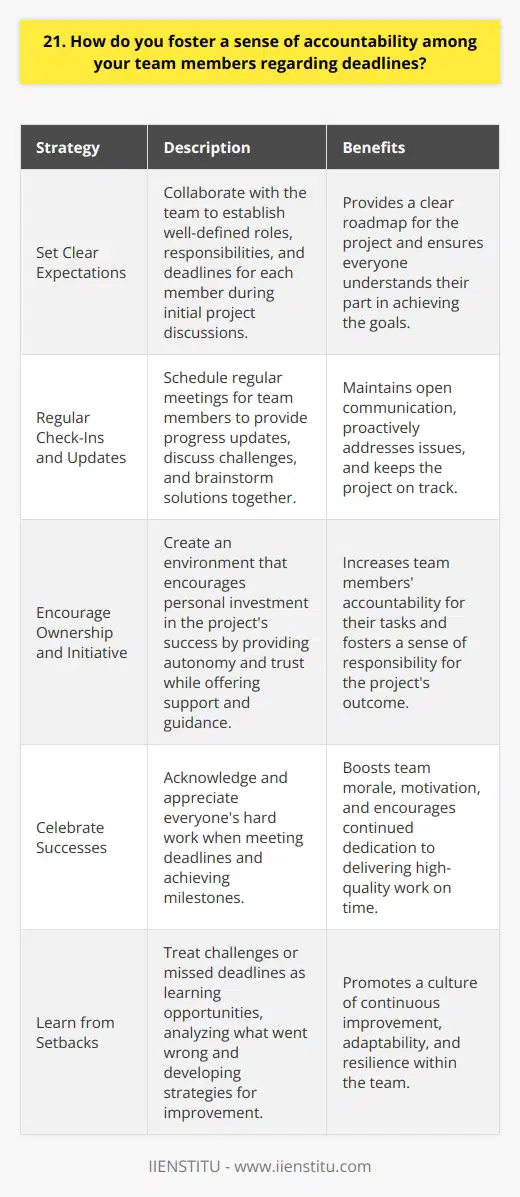
22. What role does trust play in your delegation decisions?
Trust is a crucial factor in my delegation decisions. When I have confidence in someone's abilities and reliability, I am more likely to entrust them with important tasks and responsibilities.
Building Trust
I believe trust is built over time through consistent actions and open communication. I make an effort to get to know my team members, understand their strengths and weaknesses, and foster an environment of mutual respect.
For example, when I started my current role, I scheduled one-on-one meetings with each direct report. We discussed their goals, challenges, and how I could best support them. These conversations helped establish a foundation of trust from the beginning.
Assessing Trustworthiness
When deciding whether to delegate a task, I consider several factors related to trust:
If the answer is yes, I feel more confident delegating important work to them. If not, I may start with smaller tasks while coaching them to build the necessary skills and trust over time.
Balancing Trust and Oversight
While trust is essential, I also recognize my responsibility as a manager to provide appropriate oversight. Delegating doesn't mean abdicating accountability.
I aim to strike a balance - giving my team autonomy to take ownership of their work, while still staying engaged to offer guidance and support as needed. Regular check-ins and clear expectations help maintain this balance.
In summary, trust is the bedrock of effective delegation for me. By building relationships, assessing track records, and finding the right mix of autonomy and oversight, I strive to empower my team to do their best work.
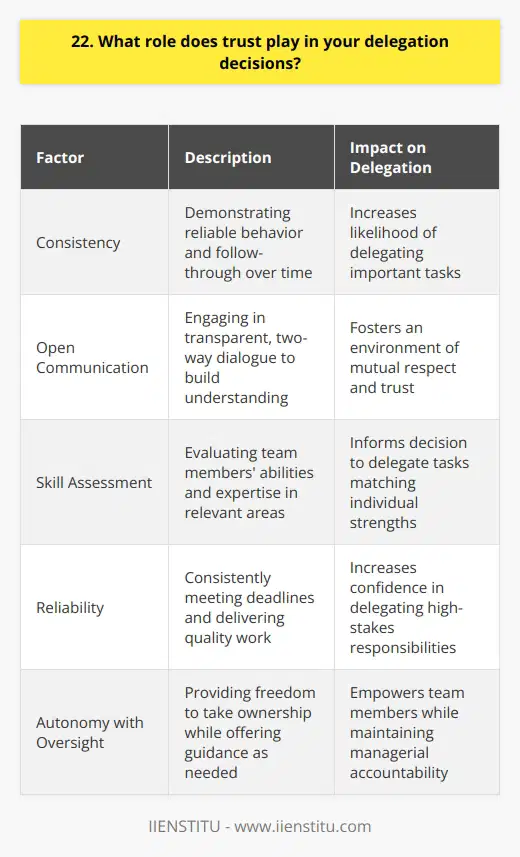
23. How do you handle a situation where a delegated task requires more time than initially anticipated?
When delegated tasks require more time than expected, I approach the situation calmly and methodically. First, I assess the reasons behind the delay and determine if there are any roadblocks I can remove to speed up the process.
Communicating with the Team
Next, I communicate with my team and the person who delegated the task. I explain the situation clearly and concisely, outlining the challenges we're facing and proposing potential solutions.
I believe in being proactive and transparent when it comes to project delays. By keeping everyone informed, we can work together to find the best way forward and ensure the task is completed successfully.
Adjusting Priorities and Resources
Depending on the nature of the delay, I may need to adjust priorities and reallocate resources. This could involve shuffling tasks around, bringing in additional team members, or even re-scoping the project if necessary.
The key is to be flexible and adaptable, while still keeping the end goal in mind. It's important to make sure that any changes align with the overall objectives of the project and the needs of the stakeholders.
Learning from the Experience
Finally, I always take the time to reflect on the experience and identify any lessons learned. Were there any warning signs that the task would take longer than expected? Could we have done anything differently to prevent the delay?
By continuously learning and improving, I can help my team become more efficient and effective in the future. Handling unexpected delays is never easy, but with the right approach and mindset, it's possible to turn a challenging situation into an opportunity for growth and success.
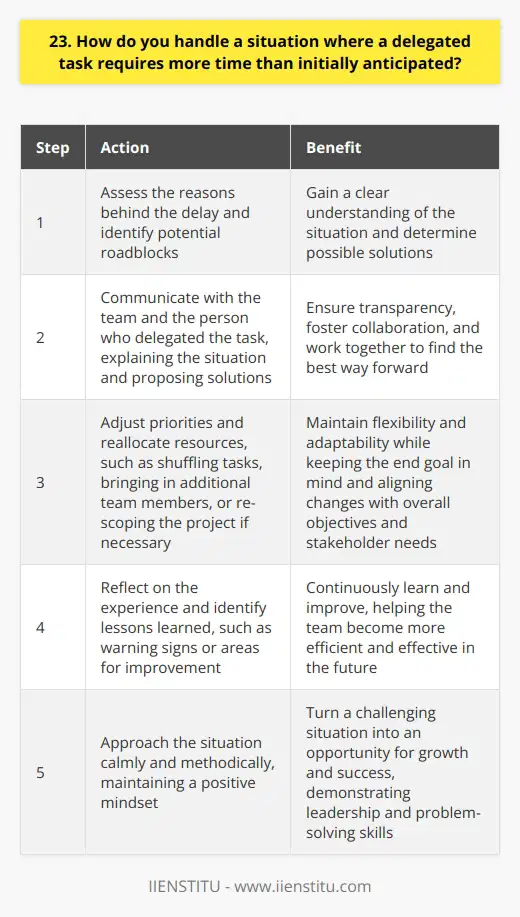
24. How do you ensure that delegated tasks align with the overall goals of the project or organization?
When delegating tasks, I always ensure they align with the project's overall goals. This involves several key steps:
Clearly Communicate Objectives
I start by clearly explaining the project's objectives to team members. Everyone needs to understand the big picture and how their work contributes to success. Regular check-ins help keep everyone on the same page.
Break Down Tasks
Next, I break down the project into specific, manageable tasks. Each task should directly support the main goals. I assign tasks based on each team member's strengths and skills. This helps people feel ownership and motivation.
Set Milestones
Setting milestones along the way lets me track progress and make adjustments as needed. I celebrate small wins to keep morale high. Frequent updates from the team help me spot any issues early on.
Provide Resources and Support
I make sure the team has all the resources and support they need to do their best work. This could mean extra training, tools, or just being available to answer questions. I try to remove any roadblocks so they can focus on moving forward.
In my experience, clear communication, organization, and ongoing support are the keys to keeping delegated tasks aligned with bigger goals. It takes some extra planning upfront but pays off in better results and a more engaged team. I'm always looking for ways to improve my delegation skills to help projects run smoothly from start to finish.
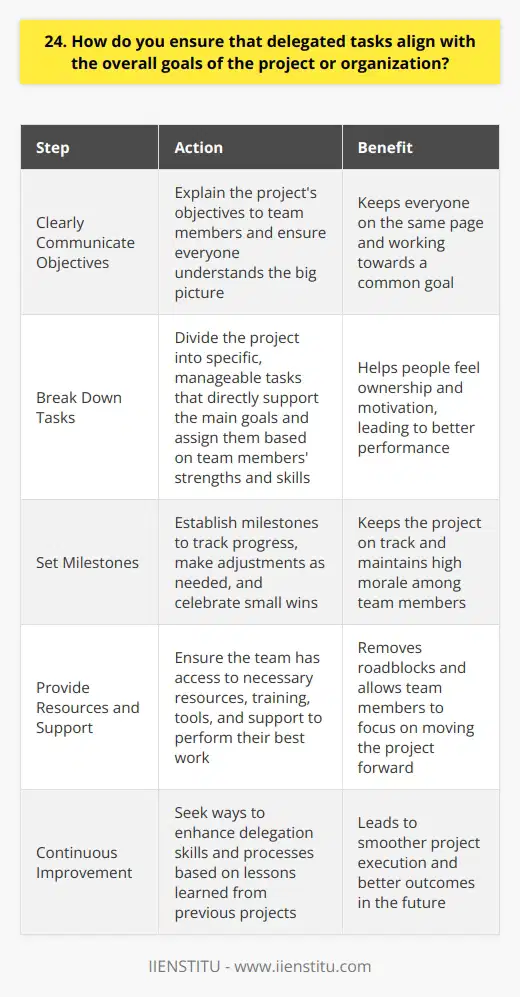
25. What strategies do you use to delegate tasks in a way that promotes work-life balance for your team members?
When delegating tasks, I focus on each team member's strengths, interests, and personal commitments outside of work. I have regular one-on-one meetings to discuss their workload and ensure they feel supported. For instance, when my team member Maria mentioned her child's upcoming school play, I adjusted her project timeline to accommodate this important family event.
Strategies for Promoting Work-Life Balance
1. Encourage Open Communication
I create a safe space for my team to express their needs and concerns. By fostering a culture of trust and openness, I can better understand and address any work-life balance issues.
2. Be Flexible with Schedules
I offer flexible working hours and remote work options whenever possible. This allows my team members to manage their personal responsibilities while still meeting project deadlines. Last month, I allowed John to work from home for a week to care for his sick parent.
3. Set Clear Expectations and Boundaries
When delegating tasks, I provide clear guidelines and deadlines but also encourage my team to set boundaries. I respect their personal time and avoid contacting them outside of work hours unless it's an emergency.
The Benefits of Promoting Work-Life Balance
By prioritizing my team's well-being, I've noticed increased productivity, creativity, and job satisfaction. When my team feels supported and valued, they are more engaged and committed to their work. Ultimately, a healthy work-life balance leads to a more positive and collaborative work environment.
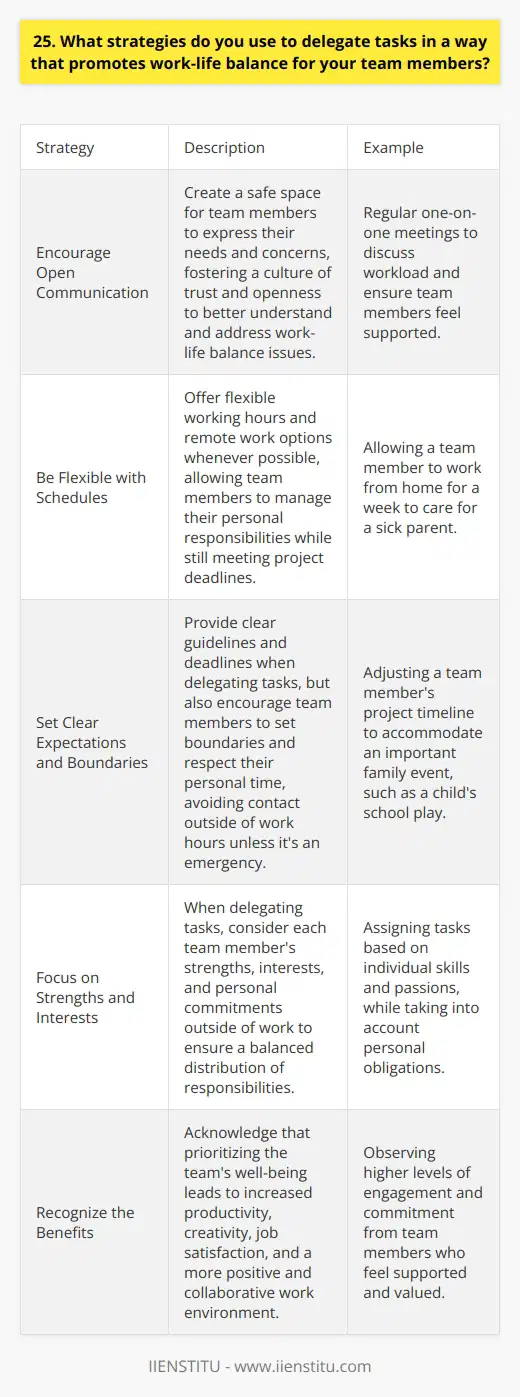
26. How do you handle a situation where a team member consistently completes tasks ahead of schedule?
When a team member consistently completes tasks ahead of schedule, it's a great opportunity to recognize their efficiency and hard work. I believe in acknowledging their efforts and expressing gratitude for their dedication to the team's success.
Assess the Impact on Team Dynamics
However, it's important to assess how their early task completion affects team dynamics. Are other members feeling pressured or discouraged? I would have an open discussion with the team to address any concerns and ensure everyone feels supported.
Explore Opportunities for Growth
I would also explore opportunities for the high-performing team member to take on additional responsibilities or mentor others. This not only keeps them engaged but also allows them to share their knowledge and skills with the team.
Maintain Balance and Well-being
At the same time, I would make sure they're not overworking themselves and maintain a healthy work-life balance. I'd encourage them to take breaks and avoid burnout, as their well-being is crucial to long-term success.
Ultimately, my approach would be to celebrate their achievements, foster a supportive team environment, and provide opportunities for growth while prioritizing everyone's well-being.
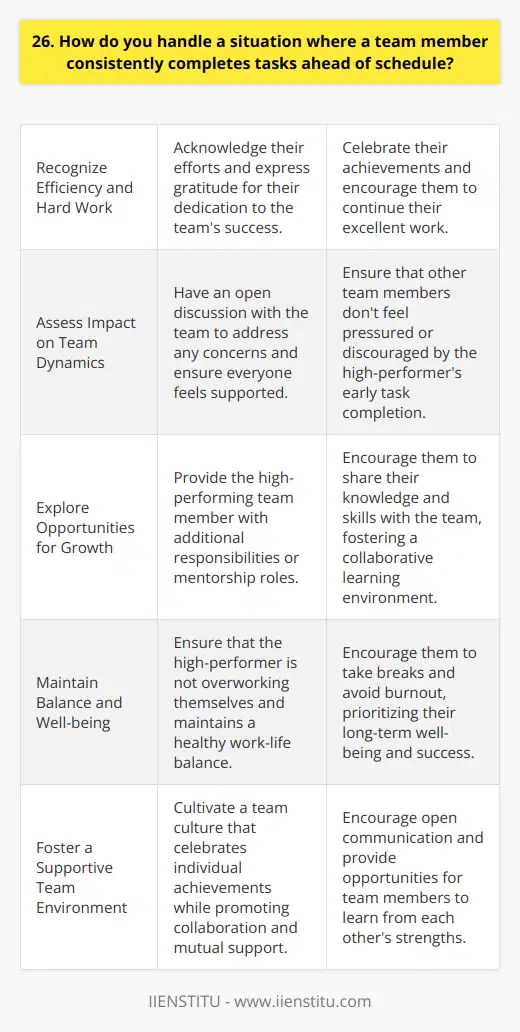
27. How do you ensure that your team members have the necessary skills to complete their delegated tasks?
I ensure my team has the necessary skills to complete their tasks through a combination of training, communication, and support. When delegating assignments, I consider each member's strengths and areas for improvement. This allows me to match tasks with the right individuals while identifying skill gaps.
Continuous Learning Opportunities
I believe in providing my team with ongoing learning opportunities. Whether it's through in-house workshops, online courses, or conferences, I encourage them to expand their knowledge and stay up-to-date with industry trends. Just last month, we organized a coding bootcamp that helped our developers sharpen their programming skills and learn new frameworks.
Open Communication and Feedback
Maintaining open lines of communication is crucial for understanding my team's challenges and progress. I schedule regular check-ins and one-on-one meetings to discuss their tasks, provide guidance, and offer constructive feedback. These conversations help me gauge their confidence levels and address any skill-related concerns they may have.
Collaborative Problem-Solving
When a team member encounters a roadblock, I encourage them to reach out for support. We foster a collaborative environment where everyone feels comfortable asking questions and seeking assistance. By working together to solve problems, we not only overcome obstacles but also share knowledge and enhance our collective skills.
Empowering Ownership and Growth
I believe in empowering my team members to take ownership of their tasks and professional growth. I provide them with the resources and autonomy they need to excel in their roles. When they successfully complete a challenging project or acquire a new skill, I make sure to recognize and celebrate their achievements, boosting their confidence and motivation.
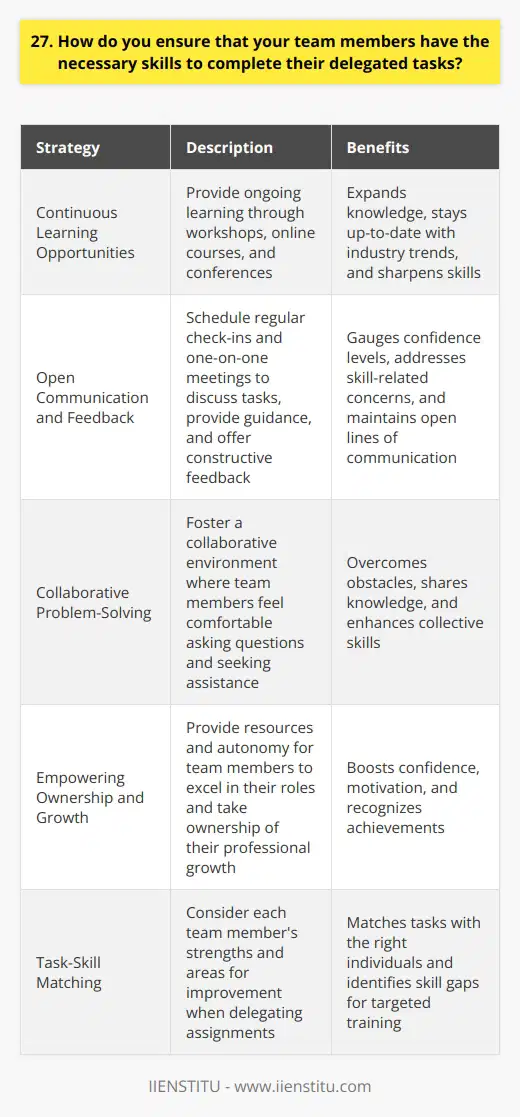
28. What methods do you use to delegate tasks in a way that fosters collaboration among team members?
I believe effective delegation fosters collaboration by empowering team members and promoting a sense of shared responsibility. When assigning tasks, I consider each person's strengths, interests, and growth opportunities to ensure a good fit.
Communicating Clear Expectations
I make sure to clearly explain the desired outcomes, timelines, and any specific requirements for the task. This helps avoid confusion and sets everyone up for success. Regular check-ins provide opportunities to answer questions, give feedback, and course-correct if needed.
Encouraging Open Communication
I strive to create an environment where team members feel comfortable sharing ideas, concerns, and suggestions. Keeping lines of communication open builds trust and facilitates collaboration. We use tools like Slack and regular team meetings to stay connected.
Providing Necessary Resources and Support
When delegating, I ensure team members have access to the information, tools, and resources they need. I'm available to provide guidance or connect them with others who can help. Knowing they have support gives people confidence to take ownership.
Recognizing Contributions and Successes
Acknowledging individual and team accomplishments boosts morale and reinforces the value of collaboration. Whether it's a shout-out in a meeting, a thoughtful email, or a celebratory lunch, showing appreciation motivates continued teamwork.
By being intentional about how I delegate, I aim to create a collaborative atmosphere where everyone feels valued and invested in our collective success.
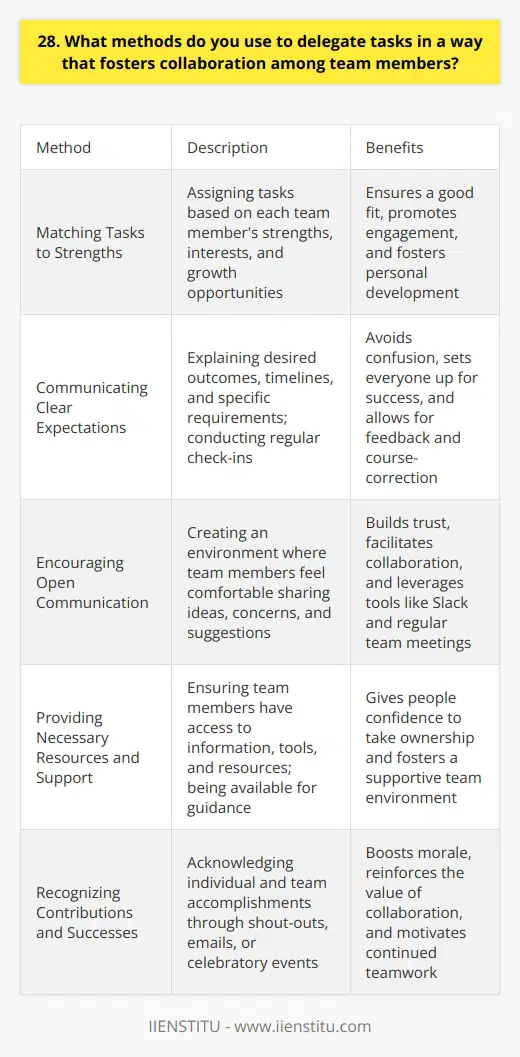
29. How do you handle a situation where a delegated task requires specialized knowledge or expertise?
When delegating a task that requires specialized knowledge or expertise, I first assess the skills and experience of my team members. If someone has the necessary background, I assign the task to them and provide any additional resources they may need. This approach allows me to leverage the strengths of my team while ensuring the task is completed effectively.
Collaborating with Experts
If no one on my immediate team possesses the required expertise, I reach out to other departments or colleagues who may have the necessary knowledge. By collaborating with experts from different areas of the organization, I can gather the information and guidance needed to complete the task successfully. This also fosters cross-functional teamwork and knowledge sharing.
Providing Training and Support
In situations where the specialized knowledge is essential for future projects, I consider providing training opportunities for my team members. This could involve workshops, online courses, or mentorship programs. By investing in the development of my team's skills, I can build a more versatile and competent workforce, ready to tackle complex challenges.
Balancing Delegation and Oversight
When delegating tasks that require expertise, I strike a balance between trusting my team and providing necessary oversight. I set clear expectations, define milestones, and establish regular check-ins to ensure the task is progressing as planned. This approach allows me to offer guidance and support while empowering my team to take ownership of their work.
In summary, handling delegation of specialized tasks involves assessing team skills, collaborating with experts, providing training opportunities, and balancing trust with oversight. By adopting these strategies, I can effectively manage complex projects while developing the capabilities of my team.
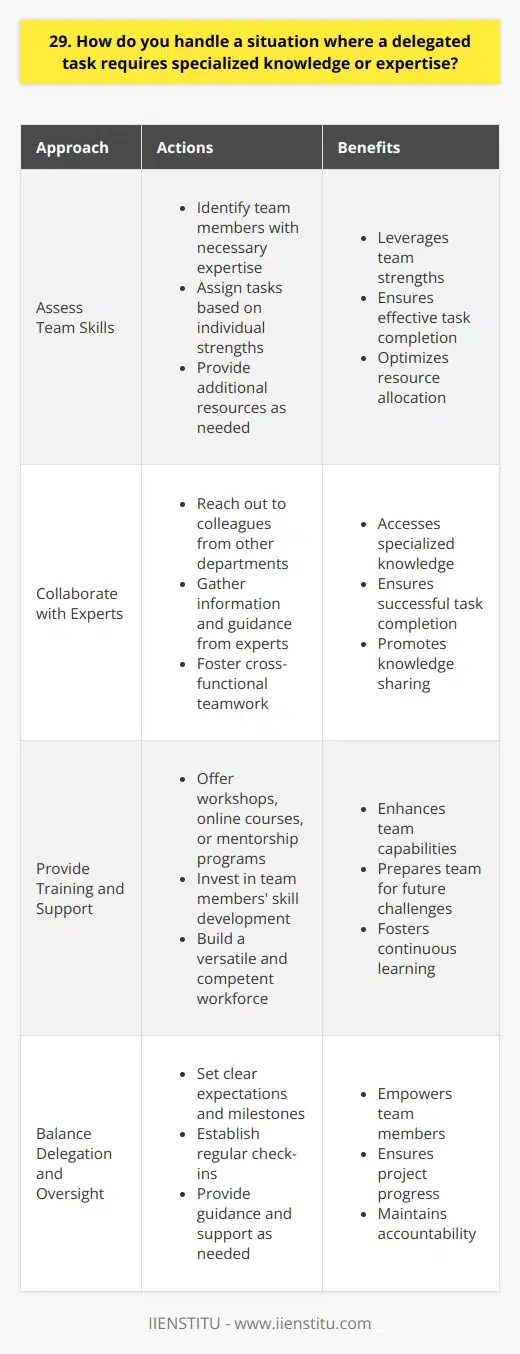
30. What role does delegation play in your overall time management strategy as a leader?
As a leader, I believe effective delegation is crucial for successful time management. It allows me to focus on high-level tasks while empowering my team members to take ownership of their responsibilities.
Prioritizing Tasks
I start by identifying which tasks are most important and require my personal attention. Everything else, I consider delegating to capable team members who have the skills and expertise to handle them effectively.
Matching Tasks with Strengths
When delegating, I carefully match tasks with each team member's strengths and interests. This not only ensures the work gets done well but also helps my team grow and develop new skills.
Providing Clear Instructions and Support
I always strive to provide clear instructions and expectations when delegating a task. I make myself available to answer questions and provide guidance as needed, while still giving my team space to work independently.
Trusting My Team
One of the most important aspects of delegation is trust. I trust my team to handle the tasks I give them and make decisions in line with our goals. This trust empowers them and frees up my time for strategic planning and other leadership responsibilities.
Continuous Improvement
Finally, I see delegation as an ongoing process of continuous improvement. I regularly check in with my team, provide feedback, and make adjustments as needed to ensure we're always working effectively and efficiently towards our objectives.
